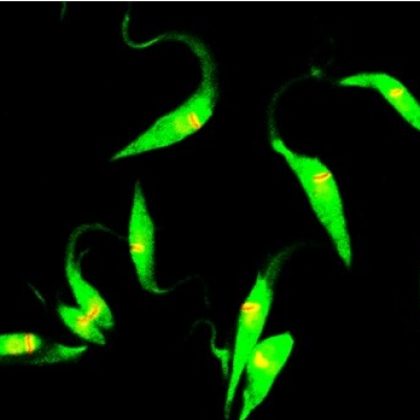Molecules from the venom of scorpions as possible antichagasic drugs
The latest Paper of the Month for Parasitology is Arg-substituted VmCT1 analogs reveals promising candidate for the development of new antichagasic agent
Molecules isolated from the venom of scorpions can be used as alternative treatments for parasitic and bacterial infections. Researchers at the Federal University of ABC – UFABC and the Federal University of Ceará – UFC have reported the antichagasic proprieties of the natural peptide VmCT1 from the scorpion Vaejovis mexicanus.
Chagas Disease is caused by the parasite Trypanosoma cruzi and it is considered a neglected disease by the World Health Organization (WHO). Chagas disease affects approximately 8 million people worldwide, leading to the death of more than 10,000 people yearly. The disease is endemic in 21 countries in Latin America, but there are cases reported in Europe, North America, Asia and Oceania.
“VmCT1 is a small peptide with 13 amino acid residues, allowing for guided changes in its sequence to generate analogs with higher biological activity and lower toxicity towards human cells” says Dr. Vani Oliveira from UFABC, the senior author of the paper. “The cationic characteristics of the most antimicrobial peptides (AMP) favors their interactions with phospholipids from bacterial membranes”.
The available treatments against Chagas disease are limited to benznidazole and nifurtimox, which cause side-effects; besides, these drugs are only effective in the acute phase of the disease, in which the patient may have few or no symptoms of the disease.
Therefore, the search for new and efficient alternatives for the treatment of Chagas disease is crucial. In this study, VmCT1 and analogs with arginine substitutions in key positions were tested against all the three forms of T. cruzi: epimastigote (present in the insect’s intestine); trypomastigote (infective form for vertebrates founded in the bloodstream) and amastigote (present in the intracellular phase, during the chronic phase of the disease). The compounds presented high anti-parasitic activity against the three forms of T. cruzi, at low peptide concentration. The activity was caused by the formation of pores that led to significant damage to the parasite’s membrane, with no detectable toxicity to healthy human cells. Thus, we are able to describe an improved AMP with high selectivity and similar mechanism of action compared to the standard drug on a benznidazole-resistant strain.
“Our results demonstrated that VmCT1 and its arginine-substituted analogs are promising anti-parasitic molecules, bringing new perspectives for the treatment of Chagas disease” comments the co-author Dr. Alice Martins from UFC.
The paper Arg-substituted VmCT1 analogs reveals promising candidate for the development of new antichagasic agent, by Cibele Nicolaski Pedron, Katielle Albuquerque Freire, Marcelo Der Torossian Torres, Dânya Bandeira Lima, Marília Lopes Monteiro, Ramon Róseo Paula Pessoa Bezerra de Menezes, Alice Maria Costa Martins and Vani Xavier Oliveira, published in Parasitology, is available free for a month.






